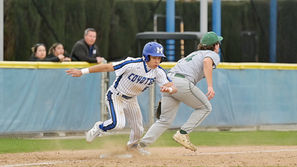School board election continues MUSD diversity
- Nov 19, 2022
- 4 min read
The Madera Unified School District Governing Board of Trustees has quietly become an unsung story of stability and success. Since the unified board was created in 1966, the vast majority of trustees had historically been both white and male. Some community leaders broke color barriers and provided crucial perspective and decision making not too long thereafter.
Reverend Naaman Haynes (1969) and B.J. Robinson (1975) broke the color barrier as the first African American trustees. Marshall Padilla (1975) and Robert Garibay (1989) were the first Hispanic trustees. Joe Flores (1989) was the first Native American Trustee. Judy Carter (1975) and Karen Griffin (1978) broke the glass ceiling and became the first female trustees. Several diverse trustees were voted into office from the late 1980s until the present. Elections brought political shifts and time brought demographic changes. Often those changes were unwelcome and majority residents felt degrees of anxiety. But the present seems wholly different.
Today, the MUSD Governing Board is made up of trustees elected by areas rather than at large. Despite how difficult that transition seemed to some, the results have settled in for an incredibly diverse and thoughtful team of elected members.
Ray Seibert (1989) has been a cornerstone of the board and has stood successfully for re-election with his belief in career technical education, teacher support, and administrative accountability. He may be the longest serving trustee in the state of California due to his professional representation of the agricultural community. Ed McIntyre (2014), Ruben Mendoza (2016), Joetta Fleak (2018), Lucy Salazar (2018), Israel Cortes (2020) and Nadeem Ahmad (2021) make up a board that represents our diverse community and all of its areas.
McIntyre leaves the Board after two full terms that saw the establishment of dual language programs — his passion project.
Madison and Washington are full school models with Pershing built as a strand that makes up about half of each grade level. Mendoza’s six years have seen professional governance and a strong expansion of school safety measures that has helped MUSD serve as a model to other districts even as we still improve each semester.
Fleak and Salazar have championed a district redesign, parent involvement and early childhood education while being fixtures at school and district events. Both trustees have connected with students, staff, and community members.
Cortes and Ahmad, the newest trustees, have clear constituencies from which they gather information and provide feedback to district leaders for improved policies. Both gentlemen bring common sense decision making and add more support for fiscal solvency.
The team works professionally as Trustee Seibert often cites, “The Board has to listen to each other and share ideas.”
Those ideas come from their wide ranging backgrounds, experiences, languages, and cultural points of view.
Joetta Fleak, like her father, Joe Flores, is a Native American and also a professional educator for her entire career. Fleak’s family roots in the Madera area go back long before Spanish colonists or American pioneers. She speaks a little Mono and remains active in North Fork Rancheria’s tribal affairs.
Israel Cortes describes himself as indigenous whose family origins are from Oaxaca. As a native Spanish speaker who is connected with our local indigenous community, Cortes provides insight and perspective on an important group of multilingual and multicultural learners and their unique experiences in Madera.
Lucy Salazar and Ruben Mendoza are both Spanish speakers who chose to raise their children and reside in Madera for most of their adult lives. Their ability to become vital leaders of their constituents and connect to the migratory experiences so many of our families have provides them unique improvement opportunities for the district.
McIntyre’s passion for Latin American culture and art inspired him to acquire Spanish in adulthood. He has found an entire board unified around the concept of multiple languages as a lifelong asset. Since the concept of dual language instruction was introduced, the MUSD Board has had a total of 12 trustees who serve at various points. All of those elected or appointed rallied around multilingualism as a crucial tool in a globalized competitive future.
The most recent embodiment of multilingualism is Nadeem Ahmad who chose to make his adult life here in Madera. He and his wife have raised their family here while maintaining strong ties to Pakistan. Ahmad’s commitment to education is born out in his experience. He has achieved multiple diplomas and degrees in Pakistan and California. Ahmad speaks Urdu, Punjabi, and English and can read and write Arabic.
The most recent Trustee-elect, Gladys Diebert, is yet another testament to the diversity of the MUSD Governing Board. Diebert was highly educated in her native Peru but relocated to California and Madera for almost her entire adult life. Like Salazar, Mendoza, and Ahmad, Diebert chose to raise her family in Madera. And like Fleak, Diebert served MUSD for her entire career. Diebert retired in 2021 as the Executive Assistant to the Superintendent and Board and brings a vast array of experiences to the Board. She is a fluent Spanish speaker and has always connected with the shared immigrant experience of our parents and students.
Our decision to change elections from at-large to areas was a difficult one fraught with real local anxiety. Demographic changes threaten to disrupt the status quo and what comes next is not always predictable. Across the nation a high degree of anxiety and frustration is loose among voters who fear these demographic changes in their region. Madera has a very interesting tale to tell the country. Demographics changes do not automatically lead to instability in local politics. Belief in our children and families creates collective community value. Our trustees have a very strong respect for our students, families, and community. We have evidence that public education, when focused on local needs, can create powerful points of agreement. The middle ground that seems lost in national politics is alive and well in the effective local educational governance of Madera.





















Comments